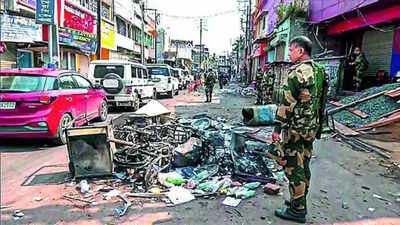
Have you ever felt the ground beneath your feet shift, not from an earthquake, but from something far more insidious? Imagine whispers turning into shouts, shadows lengthening into nightmares, and the place you called home transforming into a hostile territory overnight. This isn’t a scene from a dystopian novel, but a stark reality for many in Murshidabad, West Bengal. While news headlines briefly flashed about communal clashes, the true depth of human suffering often remains untold. Let’s delve deeper, beyond the sensationalism, and understand the unsettling truth unfolding in this corner of India.
### **A Land Torn Apart: Understanding the Murshidabad Crisis**
Recent reports emerging from Murshidabad paint a distressing picture of communal violence. Specifically, several Hindu families in villages like Saktipur, Kapasdanga, and Nowda have been targeted, leading to displacement and a pervasive sense of fear. The Indian Express report highlights how these families, once integral parts of their communities, now find themselves as refugees within their own state. This violence isn’t just about physical clashes; it’s about the erosion of trust, the shattering of social harmony, and the agonizing loss of home and security. For generations, these families lived alongside their neighbours, but suddenly, lines were drawn, and familiar faces turned menacing.
### **”Refugees in Our Own Land”: Voices from the Ground**
The most heartbreaking aspect of this crisis is the human toll. Imagine packing up your life in a hurry, leaving behind not just belongings, but memories, roots, and a sense of belonging. The voices quoted in the original article resonate with despair and uncertainty. They speak of looted homes, damaged temples, and constant threats. The phrase “refugees in our own land” poignantly captures their predicament – uprooted from their ancestral homes, seeking shelter wherever they can find it, unsure if they will ever return. This isn’t just about statistics; it’s about real people – men, women, and children – whose lives have been irrevocably altered by violence they didn’t provoke.
### **Echoes of Silence: The Unanswered Questions**
Beyond the immediate violence, linger deeper, unsettling questions. What are the underlying causes fueling this communal strife? Why did it escalate so rapidly, and what measures are being taken to ensure the safety and rehabilitation of the displaced? The silence surrounding these questions is almost as deafening as the violence itself. Rebuilding homes is one thing, but rebuilding trust and fostering a sense of security within these fractured communities is a far more complex and urgent task.
In the shadowed lanes of Murshidabad, where homes stand empty and hearts ache with displacement, a somber tale unfolds. Dust settles on deserted thresholds, whispering stories of lives abruptly paused. Families scatter like leaves in a storm, seeking solace from the tempest of hatred. Will dawn ever break fully upon this land, or will the echoes of violence forever haunt its soul? Only time, and the collective will for healing, can rewrite this narrative of despair into a poem of resilience and peace. The path to harmony demands not just words, but unwavering action, to ensure no one feels a refugee in their own cherished homeland again.